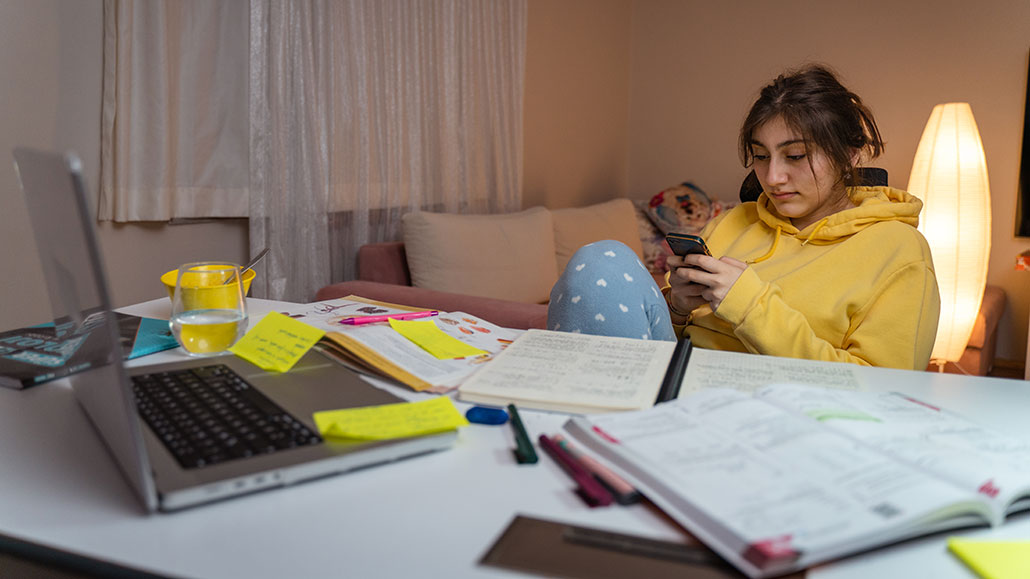Procrastination may hurt your health — but you can change that
Being kind to yourself is a good first step, researchers say

When facing a hard or unpleasant task, procrastinators may find ways to stay busy doing just about anything else.
Phynart Studio/E+/Getty Images Plus
Share this:
- Share via email (Opens in new window) Email
- Click to share on Facebook (Opens in new window) Facebook
- Click to share on X (Opens in new window) X
- Click to share on Pinterest (Opens in new window) Pinterest
- Click to share on Reddit (Opens in new window) Reddit
- Share to Google Classroom (Opens in new window) Google Classroom
- Click to print (Opens in new window) Print
By Meghan Rosen
The worst procrastinators probably won’t be able to read this story. It’ll remind them of what they’re trying to avoid, Piers Steel says.
Maybe they’re dragging their feet going to the gym. Maybe they haven’t gotten around to cleaning their rooms. Maybe they’re waiting just one more day to study for that test.
Procrastination is “putting off to later what you know you should be doing now” — even if you’ll be worse off, says Steel. He’s a psychologist at the University of Calgary in Canada. But all those tasks pushed to tomorrow seem to wedge themselves into the mind. And that could harm our health.
In a study that had thousands of university students, scientists linked procrastination to a wide range of poor outcomes. They included depression, anxiety and even disabling arm pain. “I was surprised when I saw that one,” says Fred Johansson. He’s a clinical psychologist at Sophiahemmet University. It’s in Stockholm, Sweden. His team reported the results January 4 in JAMA Network Open.
The study is one of the largest yet to tackle procrastination’s ties to health. But its results echo findings from earlier studies, says Fuschia Sirois. She’s a behavioral scientist at Durham University in England. She did not take part in the new research.
Those earlier studies have largely been ignored, Sirois says. For years, scientists didn’t seem to view procrastination as something serious. The new study could change that. “It’s that kind of big splash that’s … going to get attention,” she says. “I’m hoping that it will raise awareness of the physical health consequences of procrastination.”

Procrastinating may be bad for the mind and body
Whether procrastination harms health can seem like a chicken-and-egg question. Does procrastinating lead to health problems? Or do certain health problems make people more likely to put things off? These can be hard to tell apart, Johansson says. (Plus, it may be a bit of both.) And controlled experiments on procrastination aren’t easy to do. You can’t just tell a study participant to start procrastinating and wait to see if their health changes, he explains.
The perils of procrastinating
In a new study, researchers have tied procrastination to a range of potential health issues and other negative outcomes, including:
- Depression
- Anxiety
- Stress
- Disabling arm pain
- Poor sleep quality
- Physical inactivity
- Loneliness
- Economic difficulties
Many past studies have used self-reported surveys from a single point in time. But just one snapshot of someone makes it tricky to untangle cause and effect. The new study, though, followed about 2,500 students over nine months. That was enough time to track whether procrastinators later developed health issues.
On average, dawdlers tended to fare worse over time than did peers who were more prompt. For instance, the dawdlers were slightly more stressed, anxious, depressed and sleep-deprived.
“People who score higher on procrastination to begin with … are at greater risk of developing both physical and psychological problems later on,” notes Alexander Rozental. He’s one of the study’s authors. He’s also a clinical psychologist at Uppsala University in Sweden. “There is a relationship between procrastination at one time point and having these negative outcomes at the later point.”
This study was observational. That means scientists measured the outcomes but didn’t test the impacts of any specific factor.
From this type of study, the team can’t say for sure that putting things off causes poor health. But results from other research teams seem to point in the same direction.
One 2021 study tied procrastinating at bedtime to depression. And a 2015 study from Sirois’ lab linked procrastinating to poor heart health.
Stress may be at least partly to blame. And ill effects of chronic dawdling could build up over time, Sirois says. Procrastination alone may not cause disease, she notes. It could be, however, “one extra factor that can tip the scales.”
No, procrastinators are not lazy
About one in every five adults is thought to be a chronic procrastinator. Everyone might put off a task now and then. But chronic dawdlers make it their lifestyle, says Joseph Ferrari. A psychologist at DePaul University in Chicago, he’s been studying this for decades.
Chronic procrastinators, he says, “do it at home, at school, at work and in their relationships.” These are the people, he says, who “you know are going to RSVP late” for a party.
Many procrastinators may think they perform better under pressure. But Ferrari has reported the opposite. They actually worked more slowly and made more errors than non-procrastinators, his data show. (Some people with ADHD or similar conditions, however, report finding some procrastination helpful for focusing on tasks.)
And when deadlines are less fixed? Procrastinators tend to let their work slide. Steel’s team reported that last year in Frontiers in Psychology.
For years, researchers have focused on the personalities of people who put things off. Findings vary, but some scientists suggest procrastinators may be impulsive. They may be worriers and have trouble regulating their emotions. One thing procrastinators are not, Ferrari emphasizes, is lazy. They’re actually “very busy doing other things than what they’re supposed to be doing,” he says.
Rozental says most research today suggests procrastination is a pattern of behavior. And if it’s a behavior, he adds, that means it’s something you can change, whether you’re impulsive or not.

Why procrastinators should be kind to themselves
When people put off a tough task, they feel good — in the moment.
Procrastinating is a way to sidestep the negative emotions linked to the task, Sirois says. “We’re sort of hardwired to avoid anything painful or difficult,” she says. “When you procrastinate, you get immediate relief.” Other stress — say, a worldwide pandemic — can strain people’s ability to cope. That makes it even more appealing to put off hard things.
But the relief it provides is only temporary.
So how can people seek out ways to stop dawdling? Researchers have tried a whole range of treatments — and it’s not clear which works best. Some people say strategies to manage their time helps. But the evidence for that “is all over the map,” Sirois points out. “Poor time management is a symptom, not a cause, of procrastination.”
Simple changes may help some people. For example, Rozental advises putting down your smartphone. Silence notifications to reduce distractions. Or study in the library rather than at home; it may help you stay on task.
Still, that won’t be enough for many people, Rozental says.
Hard-core procrastinators may benefit from what’s called cognitive behavioral therapy. This involves managing thoughts and emotions and trying to change behavior. When he reviewed procrastination treatments in 2018, Rozental found this seemed most helpful. But not many studies have examined such treatments, he adds. More work in this area would help.
Sirois favors an approach centered on emotion. Too often, procrastinators can fall into a shame spiral, she says. They feel uneasy about a task — and then put it off. Now they feel ashamed for putting it off. That shame makes them feel even worse than when they started. People need to short-circuit that loop, she says.
Self-forgiveness may help, scientists suggested in one 2020 study.
So could mindfulness training. Sirois and her colleagues tested that in a small study of university students. Eight weekly mindfulness sessions reduced procrastination, they found.
In the sessions, students practiced focusing on their body. They meditated during unpleasant activities. And they discussed the best way to take care of themselves. A little self-compassion may snap people out of their spiral, Sirois says. Her team reported its findings in the January Learning and Individual Differences.
“It’s not the end of the world,” Sirois observes. The important question: “What can you do to move forward?”






